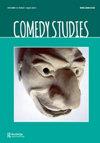Review – The applied improvisation mindset: tools for transforming organizations and communities
Q1 Arts and Humanities
引用次数: 1
Abstract
In many improv training centers, what’s called a ‘rule’ here is not necessarily taught that way. I like to think of them as ‘training wheels’, those extra wheels on bikes for new riders. When they are no longer needed, they are taken off the bike and the rider (or improvisor) takes off on their adventures. Stiles devotes a chapter to the rule ‘Don’t Ask Questions’, and she’s absolutely right the rule does not make sense for intermediate and advanced improvisors. Beginners can use that rule, though; we should call it a tool. Questions from beginners to other beginners are the result of fear and an unwillingness to make a decision or offer of their own. Without the guidance of ‘make a decision instead of asking a question’, everyone gets frustrated. Experienced improvisors can handle questions from others, and their questions can be the keys that open doors in improv. It’s also apparent from Stiles’ experience that many groups and training centers are teaching what was once advice or a tool to get someone past a roadblock as absolute rules that should never be broken even if, as in the example of the ‘dark side of Yes And’, they put improvisors at risk. When tools and advice get hardened into unbreakable rules, and are used in situations for which they weren’t developed, we are getting in our own way and our students’ way. Stiles makes a strong case for using different terminology, and to use tools appropriate to the task at hand. Improvise Freely is especially useful for teachers, trainers and coaches. Stiles enthusiastically communicates the joy of improv; her personality and expertise are readily apparent on the page.回顾-应用即兴思维:变革组织和社区的工具
在许多即兴表演培训中心,所谓的“规则”不一定是这样教的。我喜欢把它们想象成“辅助轮”,那些自行车上为新骑手准备的额外轮子。当他们不再需要的时候,他们被从自行车上取下来,骑手(或即兴演员)开始他们的冒险。斯泰尔斯专门用了一章来讨论“不要问问题”的规则,她是绝对正确的,这条规则对中级和高级即兴表演者没有意义。不过,初学者可以使用这条规则;我们应该称它为工具。初学者向其他初学者提出的问题是恐惧和不愿意做出决定或提供自己的结果。如果没有“做决定而不是问问题”的指导,每个人都会感到沮丧。有经验的即兴演员可以处理别人的问题,他们的问题可以成为打开即兴表演大门的钥匙。从斯泰尔斯的经历中也可以明显看出,许多团体和培训中心正在教授曾经是帮助某人越过障碍的建议或工具,作为绝对的规则,永远不应该被打破,即使在“是与是”的黑暗面的例子中,他们把即兴表演置于危险之中。当工具和建议被固化为牢不可破的规则,并被用于它们不适合的情况时,我们就妨碍了自己和学生的道路。Stiles强烈主张使用不同的术语,并使用适合手头任务的工具。即兴自由是特别有用的教师,培训师和教练。斯泰尔斯热情地表达了即兴表演的乐趣;她的个性和专业知识在书中显而易见。
本文章由计算机程序翻译,如有差异,请以英文原文为准。
求助全文
约1分钟内获得全文
求助全文
来源期刊

Comedy Studies
Arts and Humanities-Literature and Literary Theory
CiteScore
0.60
自引率
0.00%
发文量
26
 求助内容:
求助内容: 应助结果提醒方式:
应助结果提醒方式:


